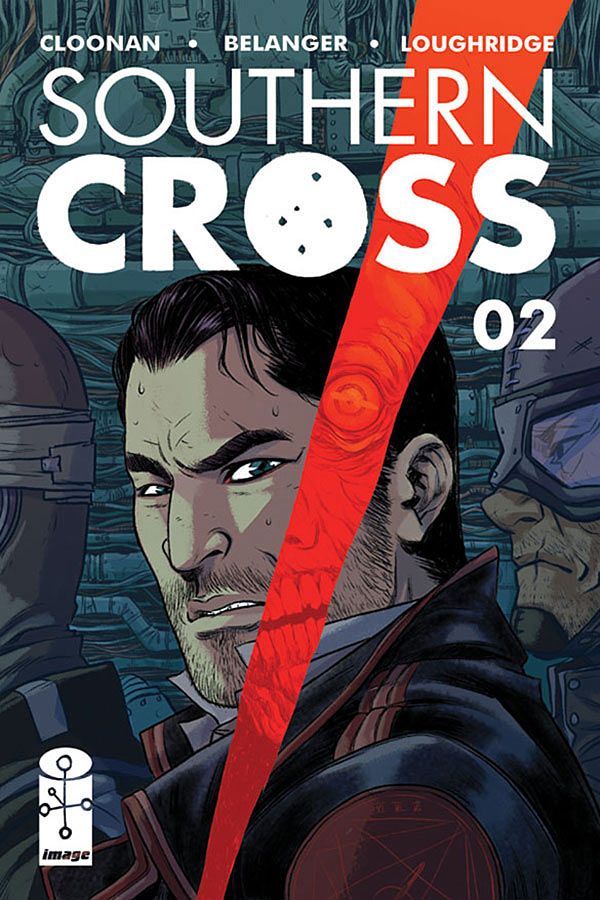In "Southern Cross" #2 by Becky Cloonan and Andy Belanger, Alex's investigation takes a strange turn. The first issue established that Erin McKenna, Alex's roommate, was investigating the death of Alex's sister, unbeknownst to Alex. Instead of taking the predictable route of having Alex and Erin join forces, Cloonan writes an unexpected twist: Erin has seemingly disappeared from the ship.
Defying reader expectations is a neat trick, but Erin's disappearance is an even bigger deal than it seems. When she goes missing, "Southern Cross" changes genre. The first issue structured itself like a quest narrative and a mystery in space. "Southern Cross" #2 takes off in a completely different direction into creepy and campy supernatural horror. When the cafeteria guy says to Alex, "it's just that sometimes rooms don't agree with folks," the foreshadowing and hinting is so heavy-handed that it jostles the reader out of the story. The folksy camp effect is funny, but it's not clear whether Cloonan and Belanger intended the scene to be humorous or whether they just failed to make it ominous. The cliffhanger on the last page goes over similarly. The visuals are too retro and the events are too over the top to be taken seriously, and thus the story loses its grip on the reader's suspension of disbelief.
Another takeaway from the cafeteria scene is that the guy at the lunch counter is obviously trying to help, and Alex doesn't endear herself to the reader by cutting him off. This is what the reader knows about Alex: she cares about her sister's death, she's capable and she doesn't trust anyone. Despite her investigations, Alex still doesn't reveal very much when she talks. Likewise, Cloonan's internal dialogue for her reveals little new information, even when Alex finds Erin's case file about Amber, so -- by the end of the issue -- Alex is still two-dimensional.
It's too early for genre change-ups and the corresponding tonal shifts when the cast and central conflicts aren't well-established yet. Also, if readers were hooked by the detective story and revenge motivations in the first issue, all the new developments about a haunted room and late night creepy-crawlies will just seem like a distraction. The campy horror and the detective story aren't mixing well. Alex's moodiness and the starlit ship are constants, but they can't hold up the story by themselves, especially when the action is slow and there aren't enough concrete details in the structure of the mystery to build much suspense.
Belanger draws a beautiful, attention-grabbing double-page spread early on, and there are gorgeous details in clothes and backgrounds throughout. The look of "Southern Cross" is responsible for a lot of its dreamy atmosphere and sense of scale, and that impression goes a long way. Belanger has ambitious page compositions and plays with perspective a lot, but sometimes these visual experiments detract from the flow of the story instead of smoothing the transitions. In one scene, he makes a talking-heads conversation pass faster by changing a gutter into a hallway. It looks cool, but it's also distracting since the concept only goes halfway. The panels themselves don't represent different rooms. Similarly, when Alex accepts a drink from Lon, it's overly complicated to depict this simple gesture with three small panels overlaid onto the larger panel. Giving so much panel space to establish mundane moments makes the whole story go slower. Even if Lon put something in that drink, it would be better to present the moment in a more understated way.
Loughridge colors the first few pages in an eye-catching mix of steely blues and greenish yellows, but most of "Southern Cross" #2 has too many monotones. Alex's room is magenta and purple, the hallways are cyan and the cafeteria is muddy pea green. This approach flattens detail instead of taking on the challenge of enhancing it. Readers shouldn't need color coding to place the setting. Belanger's art isn't the easiest to follow, but it's not so disorienting that it calls for this kind of simplification.
"Southern Cross" had a great concept, but it's not delivering yet. Cloonan and Belanger need to work more on the foundation of the story so that they can build on it.

